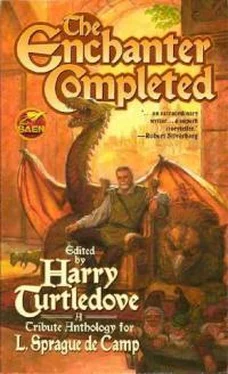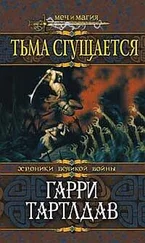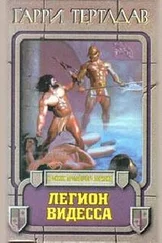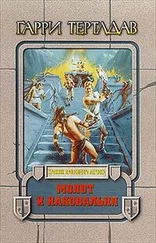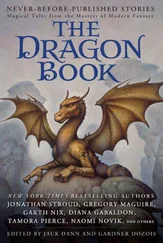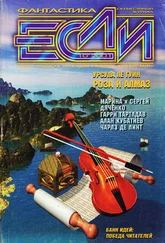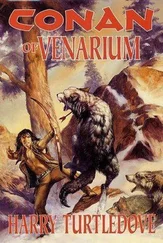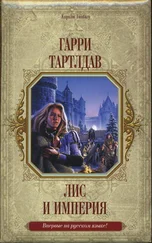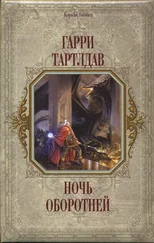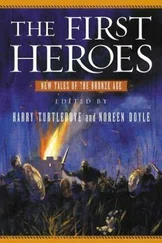Гарри Тертлдав - The Enchanter Completed
Здесь есть возможность читать онлайн «Гарри Тертлдав - The Enchanter Completed» весь текст электронной книги совершенно бесплатно (целиком полную версию без сокращений). В некоторых случаях можно слушать аудио, скачать через торрент в формате fb2 и присутствует краткое содержание. Год выпуска: 2005, ISBN: 2005, Издательство: Baen Books, Жанр: Фантастика и фэнтези, на английском языке. Описание произведения, (предисловие) а так же отзывы посетителей доступны на портале библиотеки ЛибКат.
- Название:The Enchanter Completed
- Автор:
- Издательство:Baen Books
- Жанр:
- Год:2005
- ISBN:0-7434-9904-2
- Рейтинг книги:4 / 5. Голосов: 1
-
Избранное:Добавить в избранное
- Отзывы:
-
Ваша оценка:
- 80
- 1
- 2
- 3
- 4
- 5
The Enchanter Completed: краткое содержание, описание и аннотация
Предлагаем к чтению аннотацию, описание, краткое содержание или предисловие (зависит от того, что написал сам автор книги «The Enchanter Completed»). Если вы не нашли необходимую информацию о книге — напишите в комментариях, мы постараемся отыскать её.
The Enchanter Completed — читать онлайн бесплатно полную книгу (весь текст) целиком
Ниже представлен текст книги, разбитый по страницам. Система сохранения места последней прочитанной страницы, позволяет с удобством читать онлайн бесплатно книгу «The Enchanter Completed», без необходимости каждый раз заново искать на чём Вы остановились. Поставьте закладку, и сможете в любой момент перейти на страницу, на которой закончили чтение.
Интервал:
Закладка:
In fact Sprague was born too late—in 1907—to discover Victoria Falls or the wellsprings of the Nile, or to penetrate the unknown caves of Tun-huang, or to unearth the ruins of the Mausoleum of Halicarnassus. All those jobs had been done already. So, however similar he may have been in temperament and scholarly attainments to the great Victorian explorers and archaeologists, he had to be content with following in their footsteps, retracing their paths, restudying what they had studied. However much he looked like one of those men who would come back to London every ten years or so to report on their latest achievements to the members of the Royal Geographical Society, he had to be content to live a writer’s life, not an adventurer’s, and his greatest feats of exploration were carried out on worlds of his own imagining.
He was, I think, a fundamentally shy man. (So were many of the great Victorian scholar-explorers, I suspect, which is why they preferred to spend their lives under the African or Indian sun rather than joust in the drawing rooms of London society.) Not timid, mind you: no timid man would travel to the places Sprague liked to visit, or deal as capably as he did with the often difficult Third World types he traveled among. (“I boarded one of the 40-foot launches that served as ferries, and scrunched down in the fantail with a swarm of locals, from kids to graybeards. They asked about my wives and children, and I showed them my wallet photographs. A young schoolteacher came aft to help me when I ran out of Arabic. At last someone asked if I were a Muslim or a Copt—that is, an Egyptian Christian. This was a tricky question. There are many Copts around Luxor, and there is mutual hostility between the religious comunities. I racked my brains for a tactful reply. Just as we landed, Allah sent me an inspiration. I said: ‘ Fi fiktri kull id-din kuwayyis.’ [‘In my opinion, all religions are good.’] Broad smiles all around again.”) No, when I say Sprague was shy, I mean that there was a zone of fundamental reticence and reserve about him, anoli me tangere of the soul, that led him toward a highly formal manner of behavior, a dislike of small talk, an abhorrence of any sort of personal revelation. In that, too, he was somewhat Victorian. (Though on one memorable occasion in 1985, about which I will not tell you in detail, he startled me by abruptly initiating a discussion with me of the sort men more usually have in locker rooms—but this was conducted at a party, in a very crowded room, and, of course, at the very top of his lungs.)
Despite that unlikely moment, I always regarded Sprague more as a colleague than as a close friend. I had difficulties surmounting Sprague’s highly formal manner and the gulf of nearly a generation in our ages, and over four decades of correspondence and encounters at conventions we maintained an amiable collegial relationship that only occasionally verged on becoming what I would regard as a friendship. Perhaps he was like that with almost everyone except a very few men of his own age. Yet I do recall his kindly show of interest to me, a 22-year-old newcomer, when we were both attending a small midwestern science-fiction convention long ago, and the genuinely warm weekend my wife Karen and I spent with Sprague and his lovely wife Catherine at a convention held more than thirty years later. (Theirs was a marriage that would last six decades, from 1939 until her death in April 2000, only seven months before his. Both lived on into their nineties.)
I had encountered his work a full decade before I first met him—in the late 1940s, it was, in such anthologies as Adventures in Time and Space (which included the short story “The Blue Giraffe”) and A Treasury of Science Fiction (“Living Fossil”). Quickly he became a favorite of mine, and when I began hungrily to seek out back issues of such magazines asAstounding Science Fiction and Unknown Worlds , to both of which he had been a prolific contributor, it was always an occasion for rejoicing when a de Camp story turned up in one of them. I have continued to read and reread him to this day with unalloyed pleasure.
From 1938 on he had been a mainstay of the extraordinary stable of writers that the brilliant editor of those magazines, John W. Campbell, had gathered around him—people like Robert A. Heinlein, Isaac Asimov, A.E. van Vogt, Theodore Sturgeon, Fritz Leiber. De Camp was a central figure in that group, winning a large and enthusiastic following with a multitude of stories marked by high erudition and a wry comic sense, stories so characteristically de Campian that one could identify his hand after reading only a paragraph or two. Since from my early teen years onward I had regarded his work with special pleasure, it was, of course, one of the great delights of my precocious years as a science-fiction professional to find myself not only meeting L. Sprague de Camp but to be treated by him, as he did from the beginning of my career, as a fellow practitioner of the craft.
He wrote more than a hundred books, both science fiction and fantasy, along with a great many scholarly works and books of scientific popularization. Among his significant nonfiction books were such as The Ancient Engineers, Ancient Ruins and Archaeology, and Lost Continents: The Atlantis Theme in History, Science, and Literature —and he made splendid use of that scholarship in his fiction, which, as I have noted, was marked by a taste for whimsical erudition. I think my first choice among his books is Lest Darkness Fall, which John Campbell first published in Unknown, the short-lived fantasy companion to his more famous magazine, Astounding. It’s the story, lighthearted and gripping at the same time, of a twentieth-century archaeologist transported by a bolt of lightning to the sixth century, where he strives to stave off the Dark Ages by introducing modern technology. Another notable de Camp story is The Wheels of If, (Astounding, 1940), a rollicking alternate-universe story that transports another modern man into a mysteriously transmogrified twentieth century in which, he eventually discovers, the New World is controlled by the descendants of the Viking explorers of a thousand years earlier.
Then, too, there are the famous Harold Shea fantasies that de Camp wrote in collaboration with Fletcher Pratt:The Incomplete Enchanter and its various sequels. Here again de Camp sends a man of our own time off into worlds of fantasy, this time worlds of epic poetry (the Norse sagas, Spenser’s “Faerie Queen,” etc.) And his fine historical novels—The Dragon of the Ishtar Gate, An Elephant for Aristotle, and three others—and his biographies of H.P. Lovecraft and Robert E. Howard, and his editions of Howard’s “Conan” books, which introduced Conan to the postwar generation of readers, and ever so much more—
He lived a long and astonishingly full life, went everywhere and saw everything, and set it all down on paper over half a century for several generations of delighted readers. He was an extraordinary writer, a pillar of our field, and a remarkable man as well. You can find out more about him at the web site maintained in his honor—www.lspraguedecamp.com—or you could hunt up his enormous Hugo-winning autobiographical volume,Time and Chance , published by Donald M. Grant in 1996, which sets forth his colorful life and far-flung travels in four hundred huge pages.
The Science Fiction Writers of America, in 1978, named him as the fourth winner of its highest honor, the Grand Master award, following Robert A. Heinlein, Jack Williamson, and Clifford D. Simak. It was well deserved, for de Camp was one of the shapers of modern science fiction. (And helped to define it, in a magnificent book called Science Fiction Handbook, published in 1953, which I think is the best textbook on writing science fiction ever produced. Certainly I learned plenty from it.) His particular contribution to the field was his understanding that history and geography and linguistics are sciences, even as chemistry and physics and astronomy are. Though he was educated (at Cal Tech) as an engineer, his broad and deep knowledge of world literature and world history served him well in science fiction’s primary extrapolative tasks: he was a superb storyteller, on a good day as compelling as Scheherezade, and a fascinating man as well. I’m glad to have had the privilege of knowing him and I share with you all the privilege and the pleasure of reading his work.
Читать дальшеИнтервал:
Закладка:
Похожие книги на «The Enchanter Completed»
Представляем Вашему вниманию похожие книги на «The Enchanter Completed» списком для выбора. Мы отобрали схожую по названию и смыслу литературу в надежде предоставить читателям больше вариантов отыскать новые, интересные, ещё непрочитанные произведения.
Обсуждение, отзывы о книге «The Enchanter Completed» и просто собственные мнения читателей. Оставьте ваши комментарии, напишите, что Вы думаете о произведении, его смысле или главных героях. Укажите что конкретно понравилось, а что нет, и почему Вы так считаете.
